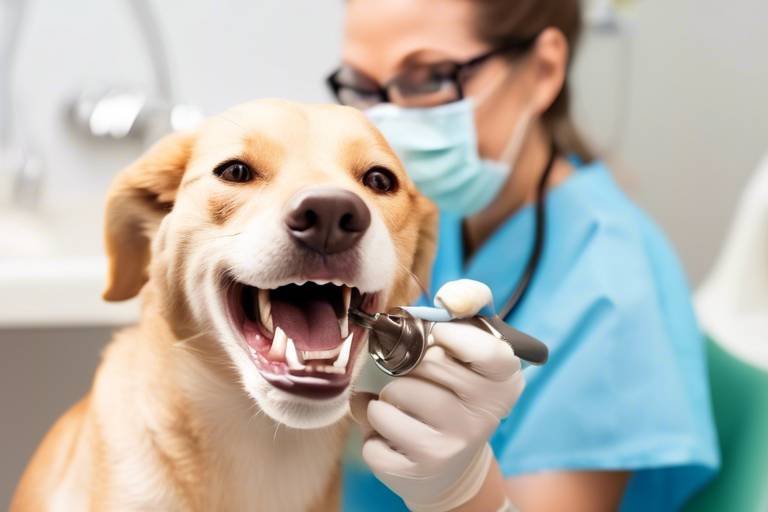The Benefits of Regular Health Screenings for Pets
As pet owners, we all want the best for our furry friends. Just like we schedule our own health check-ups, regular health screenings for pets are vital to ensuring their well-being. These screenings are not just about keeping up with vaccinations; they are comprehensive evaluations that can uncover hidden health issues before they become serious problems. Imagine being able to catch a potential health crisis before it escalates—this is the power of proactive pet care!
Think about it: your pet can’t tell you when something feels off. They can’t say, "Hey, my tummy hurts!" or "I’m feeling a bit sluggish today." This is where health screenings come into play. They provide crucial insights into your pet's health status, allowing veterinarians to detect early signs of illness. By investing in these screenings, you’re not just checking off a box on a to-do list; you're actively participating in your pet's health journey.
Moreover, regular health screenings can lead to a longer, happier life for your pet. They help to establish a baseline for your pet's health, making it easier for veterinarians to notice any changes over time. Just like how a small crack in a wall can lead to a bigger issue if left unchecked, minor health fluctuations in pets can indicate more significant problems lurking beneath the surface. By addressing these issues early, we can enhance our pets' quality of life and ensure they remain vibrant and playful companions.
In the following sections, we will delve deeper into the various aspects of pet health screenings, including the types of tests performed, the benefits of early disease detection, and how these screenings contribute to a better quality of life for our beloved animals. So, let’s embark on this journey of understanding and ensuring our pets live their best lives!
Pet health screenings are essential evaluations that help assess your pet's overall health. They provide insights into potential health issues and ensure that pets receive necessary preventive care. These screenings typically involve a combination of physical examinations, blood tests, and urine analyses, all designed to give a comprehensive overview of your pet's health status.
One of the most significant advantages of regular health screenings is the early detection of diseases. Conditions such as diabetes, kidney disease, and even cancer can be caught in their early stages, allowing for timely intervention. Imagine catching a disease early enough that treatment is straightforward and effective—this is the reality for many pets whose owners prioritize regular health check-ups.
During a health screening, several tests are typically conducted to ensure a thorough evaluation of your pet's health. These include:
- Blood Tests: These tests provide vital information about your pet's organ health, blood cell counts, and electrolyte levels, which are crucial for diagnosing various health conditions early.
- Urine Analyses: Urine tests help evaluate kidney function and detect urinary tract infections, making them an important part of comprehensive health screenings.
- Physical Examinations: A thorough examination by a veterinarian can reveal issues that may not be apparent through tests alone.
Regular health screenings are not just about catching diseases early; they also play a crucial role in enhancing your pet's quality of life. By ensuring pets are healthy through these screenings, owners can help their furry friends live longer, healthier, and happier lives. A healthy pet is often a more active and playful pet, contributing to a better overall atmosphere in the household.
Health issues can often manifest as behavioral changes in pets. For example, a normally playful dog may become lethargic or irritable if it is in pain or discomfort. Regular screenings help identify these underlying problems, allowing for timely intervention. By addressing health concerns early, owners can improve their pets' well-being and restore their joyful demeanor.
Knowing that your pet is healthy provides peace of mind for owners. Regular health screenings foster a proactive approach to pet care, reducing anxiety about potential health issues. You can rest easy knowing that you’re doing everything possible to keep your furry friend in tip-top shape!
Investing in regular health screenings can save money in the long run by preventing costly treatments for advanced diseases. Early intervention is often more affordable and effective than treating serious conditions later. Just like how maintaining a car is cheaper than waiting for it to break down, regular health check-ups can help avoid the hefty bills associated with emergency vet visits and complex treatments.
Q: How often should I take my pet for health screenings?
A: Generally, it’s recommended to have your pet screened at least once a year. However, older pets or those with existing health issues may require more frequent check-ups.
Q: What should I expect during a health screening?
A: A typical health screening may include a physical examination, blood tests, and urine analyses, as well as discussions about your pet's diet, behavior, and lifestyle.
Q: Are health screenings expensive?
A: While there is a cost associated with health screenings, they can save you money in the long run by preventing more serious and costly health issues.

Understanding Pet Health Screenings
When it comes to our beloved furry friends, is essential for ensuring their well-being. These screenings are not just a routine check-up; they are comprehensive evaluations that can uncover hidden health issues before they become serious problems. Think of them as a preventive safety net for your pet, designed to catch potential health risks early on. Just like we go for annual physical exams, our pets also need regular check-ups to maintain their health and happiness.
So, what exactly do these health screenings involve? Generally, they consist of a combination of physical examinations and diagnostic tests that give veterinarians a closer look at your pet's overall health. The primary goal is to assess your pet's well-being and identify any potential health concerns that may not be immediately apparent. By staying proactive, pet owners can ensure that their companions receive the preventive care they need to thrive.
During a typical health screening, your veterinarian will conduct a thorough physical examination that includes checking your pet's weight, heart rate, and overall body condition. In addition to this, diagnostic tests such as blood work and urine analysis are often performed. These tests help in assessing the function of vital organs and can reveal issues like kidney disease, diabetes, or infections. The earlier these conditions are detected, the better the chances of effective treatment.
Moreover, it's worth noting that health screenings can be tailored to the specific needs of your pet. For example, older pets may require more frequent screenings due to their increased risk of developing health issues. On the other hand, younger pets might need less frequent check-ups but should still undergo screenings to establish a baseline for their health. This tailored approach ensures that every pet receives the appropriate level of care based on their individual health status.
In summary, pet health screenings are a crucial component of responsible pet ownership. They not only provide insights into your pet's current health but also help in preventing future health problems. By understanding the importance of these screenings, you can make informed decisions that contribute to your pet's long and happy life.

Early Detection of Diseases
When it comes to our beloved pets, can be a game changer. Imagine being able to spot a potentially serious health issue before it escalates into something far more dangerous. Regular health screenings serve as a preventive measure that allows pet owners to catch these problems in their infancy. This proactive approach not only saves lives but also enhances the overall well-being of our furry friends.
Many common pet illnesses, such as diabetes, cancer, and kidney disease, can develop silently, often without any obvious symptoms until they reach an advanced stage. This is where the importance of regular check-ups comes into play. By conducting routine screenings, veterinarians can identify subtle changes in a pet's health that might otherwise go unnoticed. For instance, a simple blood test can reveal early signs of diabetes, allowing for timely dietary adjustments and treatment plans.
Moreover, the emotional toll of an unexpected diagnosis can be overwhelming for pet owners. Knowing that you are taking the necessary steps to monitor your pet's health can provide a sense of reassurance. It’s like having a safety net; you’re not just waiting for the worst to happen but actively working to prevent it. This peace of mind is invaluable, as it creates a stronger bond between you and your pet, knowing you are doing everything possible to ensure their health.
During health screenings, several tests are typically performed to assess a pet's health status. These tests include:
- Blood Tests: These are crucial for evaluating organ function and identifying any abnormalities in blood cell counts.
- Urine Analyses: Useful for assessing kidney function and detecting urinary tract infections.
- Physical Examinations: A thorough physical check-up can reveal signs of health issues that may not be apparent through tests alone.
Each of these tests plays a vital role in creating a comprehensive picture of your pet's health. For instance, blood tests can highlight issues related to liver or kidney function, while urine analyses can indicate whether your pet is at risk for urinary tract infections, which are surprisingly common in pets. By identifying these issues early, veterinarians can recommend lifestyle changes or treatments that can significantly improve your pet's quality of life.
In summary, regular health screenings are not just a luxury; they are a necessity for ensuring the long-term health of our pets. By prioritizing early detection, we empower ourselves as pet owners to take charge of our furry companions' health, ultimately leading to longer, happier lives together.
Q: How often should I take my pet for health screenings?
A: It’s generally recommended to schedule health screenings at least once a year for younger pets, and more frequently for senior pets or those with existing health conditions.
Q: What should I expect during a health screening?
A: During a health screening, your veterinarian will perform a physical examination, and may conduct blood tests and urine analyses to assess your pet's overall health.
Q: Are health screenings expensive?
A: While there is a cost associated with health screenings, they can save you money in the long run by preventing more serious and costly health issues.
Q: Can I perform health screenings at home?
A: While some aspects of pet health can be monitored at home, such as weight and behavior, professional screenings are essential for accurate diagnosis and treatment.
Common Tests Conducted
When it comes to ensuring our pets lead healthy lives, common tests conducted during health screenings play a pivotal role. These tests are not just routine checks; they are essential tools that help veterinarians assess your furry friend’s overall health. Imagine these tests as the detectives of the veterinary world, uncovering hidden health issues before they escalate into serious problems.
Among the most frequently performed tests are blood tests, urine analyses, and comprehensive physical examinations. Each of these tests serves a unique purpose and provides invaluable insights into your pet's health status. For instance, blood tests can reveal a lot about your pet's organ health, blood cell counts, and electrolyte levels. They are crucial for diagnosing various health conditions early on, which can drastically change the treatment landscape.
Urine analyses, on the other hand, are like a window into your pet’s urinary system. They help evaluate kidney function and can detect urinary tract infections, which are surprisingly common in pets. A simple urine test can provide a wealth of information, helping to catch issues that might otherwise go unnoticed until they become serious.
Physical examinations are another cornerstone of health screenings. During these exams, veterinarians assess your pet's body condition, check for any lumps or abnormalities, and evaluate their overall demeanor and behavior. Think of it as a thorough check-up where nothing is overlooked. This holistic approach ensures that every aspect of your pet's health is considered.
In summary, the common tests conducted during health screenings are vital components of a proactive pet healthcare strategy. By identifying potential health issues early through blood tests, urine analyses, and physical examinations, we can ensure our beloved pets enjoy longer, healthier lives. It's like having a safety net that catches problems before they become serious, allowing us to intervene swiftly and effectively.
Q1: How often should my pet have a health screening?
Most veterinarians recommend annual health screenings for pets. However, older pets or those with existing health issues may require more frequent evaluations.
Q2: Are health screenings painful for my pet?
Health screenings are generally non-invasive. Blood tests may cause slight discomfort, but they are quick and usually well-tolerated by pets.
Q3: What should I do to prepare my pet for a health screening?
It's best to follow your veterinarian's specific instructions. This might include fasting before blood tests or bringing along your pet's medical history.
Q4: Can I get a second opinion on my pet's health screening results?
Absolutely! If you're unsure about the results or recommendations, seeking a second opinion from another veterinarian is always a good idea.
Blood Tests
When it comes to our beloved pets, are one of the most critical tools veterinarians have at their disposal. These tests provide a wealth of information that can reveal hidden health issues before they become serious problems. Imagine your pet as a car; without regular checks under the hood, you might not notice a small leak that could lead to major engine trouble down the road. Similarly, blood tests can catch potential health concerns early, allowing for timely interventions that can save your pet’s life.
So, what exactly do blood tests measure? They can assess various aspects of your pet's health, including:
- Organ Function: Blood tests can evaluate how well your pet's organs, such as the liver and kidneys, are functioning. This is crucial for detecting diseases that may not show any obvious symptoms.
- Blood Cell Counts: These tests measure the levels of red and white blood cells, which can indicate conditions like anemia, infections, or even leukemia.
- Electrolyte Levels: Maintaining a proper balance of electrolytes is essential for overall health. Blood tests can help identify imbalances that might affect your pet’s heart and muscle functions.
Additionally, blood tests can screen for specific diseases such as diabetes, hypothyroidism, and even certain types of cancers. For instance, a simple blood test can reveal elevated glucose levels, signaling the onset of diabetes, which, if caught early, can be managed effectively with dietary changes and medication.
One of the most valuable aspects of blood tests is their ability to provide a baseline for your pet's health. Just as you would keep track of your own health metrics, having a historical record of your pet's blood test results can help veterinarians spot trends or changes over time. This proactive approach to pet health can lead to better outcomes and a longer, healthier life for your furry friend.
In conclusion, regular blood tests are not just a routine procedure; they are a vital component of your pet's healthcare. By understanding the significance of these tests, you can take an active role in your pet's health journey, ensuring they thrive for years to come.
- How often should my pet have blood tests? - Generally, it is recommended to have blood tests done annually for healthy pets, but older pets or those with health issues may require more frequent testing.
- Are blood tests painful for pets? - Blood tests involve a quick needle prick, which may cause a momentary discomfort, but it is usually over very quickly.
- What should I do if my pet's blood test results are abnormal? - If the results are abnormal, your veterinarian will discuss the next steps, which may include further testing or treatment options.
Urine Analyses
Urine analyses are a critical component of comprehensive health screenings for pets, offering valuable insights into their overall health status. By examining the composition of a pet's urine, veterinarians can glean important information about their kidney function, hydration levels, and the presence of any potential infections or diseases. This non-invasive test is a quick and effective way to monitor your furry friend's health and catch any issues early on.
During a urine analysis, several key factors are evaluated. These include:
- Specific Gravity: This measures the concentration of urine and helps assess hydration levels.
- pH Level: The acidity or alkalinity of urine can indicate various health issues, including urinary tract infections.
- Protein Levels: Elevated protein levels may suggest kidney disease or other underlying health problems.
- Glucose and Ketones: The presence of glucose can indicate diabetes, while ketones may suggest metabolic disorders.
- Crystals or Sediment: These can point to urinary tract issues or potential kidney stones.
What makes urine analyses particularly beneficial is their ability to detect issues that may not present obvious symptoms. For instance, a pet might seem perfectly healthy but could be harboring a urinary tract infection or early signs of kidney disease. By identifying these conditions through urine analysis, pet owners can take proactive steps to address them, often before they escalate into more serious health concerns.
Moreover, urine analyses are often performed in conjunction with blood tests to provide a more comprehensive view of your pet's health. This combination allows veterinarians to correlate findings and make more informed decisions regarding diagnosis and treatment. The results can lead to tailored health plans that may include dietary changes, lifestyle modifications, or specific medications, ensuring that your pet receives the best possible care.
In summary, urine analyses are an essential part of routine health screenings for pets, offering a window into their internal health. Regular testing can help to catch problems early, leading to timely interventions that can greatly improve your pet's quality of life. So, the next time you take your furry friend for a check-up, remember that this simple test could be a lifesaver!
- How often should my pet have a urine analysis? It's generally recommended to have a urine analysis done annually, or more frequently if your pet has existing health issues.
- Is urine analysis painful for my pet? No, urine analysis is non-invasive and does not cause any discomfort to your pet.
- What should I do if the urine analysis shows abnormalities? Consult your veterinarian for further evaluation and to discuss potential treatment options.
Preventive Care Benefits
Regular health screenings for pets are not just about identifying existing health issues; they play a crucial role in preventive care. Think of these screenings as a safety net, catching potential problems before they spiral out of control. By investing in routine evaluations, pet owners can take proactive steps to ensure their furry friends remain healthy and vibrant. This approach allows for timely interventions that can significantly reduce the risk of serious diseases.
When we talk about preventive care, we're referring to a range of strategies that can help maintain a pet's well-being. Regular screenings can lead to the implementation of lifestyle changes that can make a world of difference. For instance, if a screening reveals that your pet is overweight, your veterinarian may recommend a tailored diet and exercise plan. This not only helps in managing weight but also reduces the risk of obesity-related conditions such as diabetes or joint problems.
Moreover, vaccinations are another critical aspect of preventive care that can be discussed during health screenings. Vaccines protect pets against various infectious diseases that can be costly and challenging to treat. By ensuring your pet is up-to-date on vaccinations through regular check-ups, you are effectively safeguarding their health and preventing potential outbreaks.
In addition to physical health, preventive care also encompasses mental well-being. Regular screenings can help identify behavioral issues that may arise from underlying health problems. For example, if a pet suddenly becomes aggressive or withdrawn, it could be a sign of pain or discomfort. Early detection through screenings allows for timely treatment, ensuring that your pet remains happy and well-adjusted.
To summarize the benefits of preventive care, consider the following:
- Early Intervention: Addressing issues before they escalate.
- Cost Savings: Avoiding expensive treatments for advanced diseases.
- Improved Quality of Life: Keeping pets healthy and active.
- Enhanced Owner Awareness: Educating owners about their pet's health needs.
In conclusion, the importance of regular health screenings cannot be overstated. They are the cornerstone of preventive care, allowing pet owners to take charge of their pets' health. By fostering a proactive approach, we can ensure that our beloved companions live longer, healthier, and happier lives. So, let’s not wait for symptoms to appear; let’s make regular health screenings a priority for our furry family members!
Q: How often should I take my pet for health screenings?
A: It’s generally recommended to have your pet screened at least once a year. However, older pets or those with existing health issues may require more frequent visits.
Q: Are health screenings painful for my pet?
A: Most health screenings are non-invasive and cause minimal discomfort. Your veterinarian will ensure that your pet is as comfortable as possible during the process.
Q: What should I expect during a health screening?
A: A typical health screening may include a physical examination, blood tests, urine analysis, and a discussion about your pet's diet and behavior. Your veterinarian will guide you through each step.
Q: Can I do anything at home to help with my pet's health?
A: Absolutely! Regular exercise, a balanced diet, and mental stimulation are key components of a healthy lifestyle for pets. Plus, keeping an eye on any changes in behavior can help catch issues early.

Improving Quality of Life
When we think about the quality of life for our furry friends, it goes beyond just their physical health. Regular health screenings play a pivotal role in ensuring that our pets not only live longer but also enjoy a more fulfilling life. Imagine if your pet could tell you how they feel; regular check-ups give us that insight, allowing us to understand their health better. It's like having a window into their well-being, where we can see potential issues before they become serious problems.
One of the most significant benefits of these screenings is the ability to catch health issues early. Just like humans, pets can experience various health problems that may not be immediately apparent. For instance, a pet that suddenly becomes less active or shows changes in appetite might be signaling an underlying issue. Regular health screenings can help identify these problems before they escalate, enabling timely interventions. This proactive approach can mean the difference between a short-lived treatment and a long-term solution, ultimately enhancing your pet's life quality.
Moreover, health screenings can also lead to improvements in your pet's behavioral health. Pets often express discomfort or pain through changes in their behavior. They might become more withdrawn, irritable, or even aggressive. By identifying health problems early through screenings, you can address these issues, leading to a happier and more stable pet. For example, if a pet is diagnosed with a dental issue during a screening, treating it can restore their comfort and improve their overall demeanor, making them more playful and affectionate.
Additionally, regular screenings encourage a holistic view of your pet's health. They empower you as a pet owner to make informed decisions about your pet's diet, exercise, and lifestyle. For instance, if a screening reveals that your pet is overweight, your veterinarian can provide tailored advice on nutrition and exercise plans. This not only helps in managing weight but also contributes to overall well-being, allowing your pet to thrive. Think of it as a roadmap to a healthier life, guiding you through the necessary changes to ensure your pet's happiness.
Lastly, there’s an undeniable emotional component to knowing your pet is healthy. It brings a sense of peace of mind to pet owners. You can rest easy, knowing that you are actively participating in your pet's health journey. This peace of mind is invaluable, reducing anxiety and allowing you to focus on the joy your pet brings into your life. After all, our pets are family, and ensuring their well-being is one of the greatest gifts we can give them.
- How often should my pet have health screenings? It’s generally recommended to have your pet screened at least once a year, but older pets or those with existing health issues may require more frequent visits.
- What should I expect during a health screening? Expect a thorough examination, including physical checks, blood tests, and urine analyses. Your vet will discuss the results and any necessary follow-up care.
- Are health screenings expensive? While there is a cost involved, regular screenings can save you money in the long run by preventing more serious and costly health issues.
Behavioral Changes
When it comes to our beloved pets, their behavior is often the first clue that something might be off. Just like humans, pets can exhibit a range of that signal underlying health issues. Have you ever noticed your furry friend acting a bit more withdrawn than usual? Or perhaps they seem more irritable or anxious? These changes can be subtle, but they are crucial indicators of your pet's health status.
For instance, a normally playful dog that suddenly shows disinterest in playtime may be experiencing discomfort or pain. Similarly, a cat that has always been a social butterfly but now prefers to hide away could be dealing with stress or illness. Recognizing these behavioral shifts is vital because they often point to underlying medical conditions that require attention.
Regular health screenings can help pinpoint the root causes of these behavioral changes. During these evaluations, veterinarians can assess not just the physical health of your pet but also their mental well-being. Here are some common behavioral changes that might be observed:
- Increased Aggression: If your pet is snapping or growling when they typically wouldn’t, it could indicate pain or discomfort.
- Excessive Lethargy: A sudden drop in energy levels can signal various health issues, from infections to chronic illnesses.
- Changes in Appetite: A noticeable increase or decrease in food intake can be a sign of health problems.
- House Soiling: If your pet is suddenly having accidents indoors, it could indicate a urinary tract infection or other health concerns.
Identifying these behavioral changes through regular screenings allows for timely intervention. For example, if a pet is diagnosed with a condition like arthritis early on, lifestyle modifications, pain management, and even weight control can be implemented to improve their quality of life. The earlier we catch these issues, the better the chances for effective treatment and recovery.
Moreover, understanding your pet’s behavior can foster a more profound bond between you and your furry friend. It’s not just about spotting health issues; it’s about being attuned to their needs and emotions. Regular health screenings help ensure that you are not only a pet owner but also a responsible caretaker who prioritizes the well-being of your companion.
In summary, being aware of your pet's behavioral changes is essential for their health. Regular health screenings can help uncover potential problems, allowing for early intervention and treatment. After all, our pets rely on us to recognize when something isn’t right, and being proactive can make all the difference in their lives.
- How often should I take my pet for health screenings? It’s generally recommended to have your pet screened at least once a year. However, older pets or those with existing health issues may require more frequent visits.
- What specific tests are included in a typical health screening? A typical health screening may include blood tests, urine analyses, and a thorough physical examination.
- Can behavioral changes in my pet indicate serious health issues? Yes, changes in behavior can often be the first signs of underlying health problems, so it’s crucial to consult your veterinarian if you notice anything unusual.
- Are health screenings expensive? While there is a cost associated with health screenings, they can save you money in the long run by preventing more serious health issues that require costly treatments.
Owner Peace of Mind
When it comes to our beloved pets, the thought of them facing health issues can be overwhelming. However, regular health screenings provide a sense of peace of mind for pet owners. Imagine being able to sleep soundly at night, knowing that your furry friend is in good health. This reassurance stems from the proactive approach that regular screenings offer. Instead of waiting for symptoms to arise, you can take charge of your pet's health and catch potential issues before they escalate.
Think about it: would you rather wait until your pet shows signs of illness, or would you prefer to have regular check-ups that can reveal hidden problems? Regular screenings allow you to stay ahead of the game. They provide valuable insights into your pet's health status, enabling you to make informed decisions. For instance, if a blood test indicates a slight imbalance, you can work with your veterinarian to make dietary adjustments or lifestyle changes before it becomes a serious issue.
Moreover, knowing that your pet is regularly evaluated fosters a deeper bond between you and your furry companion. It’s like having a safety net—one that not only protects your pet but also alleviates your worries. You can focus on the fun moments, like playing fetch in the park or cuddling on the couch, without the nagging fear of undetected health problems lurking in the background.
In addition, regular health screenings can also enhance your pet's longevity. With early detection and intervention, many health conditions can be managed effectively, allowing your pet to live a longer, happier life. This not only benefits your pet but also enriches your life as an owner, as you get to enjoy more years of companionship.
To illustrate the benefits of peace of mind that regular health screenings bring, consider the following table:
| Benefit | Description |
|---|---|
| Early Detection | Identifies potential health issues before they become serious, allowing for timely treatment. |
| Proactive Care | Enables owners to take preventive measures, such as vaccinations and dietary changes. |
| Reduced Anxiety | Knowing your pet is healthy lessens the worry about unexpected health crises. |
| Enhanced Bond | Regular check-ups create a sense of security, strengthening the relationship between pet and owner. |
In summary, the peace of mind that comes with regular health screenings cannot be overstated. They empower pet owners to take control of their pet's health, ensuring that any potential issues are addressed promptly. This proactive approach not only protects your pet but also enhances the quality of life for both of you. So, the next time you schedule a health screening, remember that you’re not just investing in your pet’s health; you’re also investing in your own peace of mind.
- How often should my pet have a health screening? It is generally recommended that pets have a health screening at least once a year, but older pets or those with existing health issues may require more frequent check-ups.
- What types of tests are included in a typical health screening? A typical health screening may include blood tests, urine analyses, and a thorough physical examination by a veterinarian.
- Can regular screenings prevent health issues? While they cannot prevent all health issues, regular screenings can help detect problems early, allowing for timely intervention and management.
- What should I do if my pet's screening results are abnormal? If your pet's screening results are abnormal, consult your veterinarian immediately for further evaluation and treatment options.

Cost-Effectiveness of Screenings
Investing in regular health screenings for your pets might seem like an additional expense at first, but when you take a closer look, it becomes clear that this investment can actually save you money in the long run. Think of it as buying insurance for your furry friend. Just like how we pay for health insurance to catch potential health issues before they escalate, regular screenings can help you do the same for your pets. By identifying health concerns early, you can avoid the hefty costs associated with treating advanced diseases that could have been prevented.
For instance, consider the potential costs of treating a pet with advanced diabetes versus managing the condition through early detection. Early intervention might only require a change in diet and some medications, while late-stage diabetes could lead to expensive treatments, frequent vet visits, and even emergency care. The difference in costs can be staggering. Here’s a simple comparison:
| Condition Stage | Estimated Cost of Treatment | Preventive Screening Cost |
|---|---|---|
| Early Detection of Diabetes | $200 - $500 | $100 - $200 |
| Advanced Diabetes | $1,500 - $3,000 | N/A |
As illustrated in the table above, the upfront cost of preventive screenings is significantly lower than the potential expenses incurred from treating advanced conditions. Moreover, regular health screenings can lead to better overall health outcomes, which means fewer vet visits and less money spent on medications over time. When you think about it, it’s a win-win situation for both you and your pet!
Additionally, many veterinary clinics offer wellness plans that include regular health screenings at a discounted rate. These plans not only make it more affordable but also encourage pet owners to stay on top of their pets' health. By committing to a wellness plan, you can spread out the costs over the year, making it easier on your budget while ensuring your pet stays healthy.
In conclusion, when you weigh the costs of regular health screenings against the potential expenses of treating serious illnesses, it’s clear that screenings are a smart financial choice. They not only help keep your pet healthy but also provide peace of mind knowing you're taking proactive steps to prevent serious health issues. So, why not invest in your pet’s health today? After all, a healthy pet means a happy owner!
- How often should I get my pet screened? - Most veterinarians recommend annual screenings for healthy pets, while older pets or those with health issues may need more frequent evaluations.
- What types of tests are included in a typical screening? - Common tests include blood tests, urine analyses, and physical examinations to assess your pet's overall health.
- Are screenings painful for my pet? - Most screenings involve minimal discomfort, similar to a routine check-up. Your vet will ensure your pet is as comfortable as possible.
- Can I afford regular screenings? - While there is an upfront cost, the long-term savings from early detection and prevention often outweigh the initial investment.
Frequently Asked Questions
- What are pet health screenings?
Pet health screenings are comprehensive evaluations that assess your furry friend's overall health. These screenings help identify potential health issues before they become serious problems, ensuring your pet receives the preventive care they need.
- How often should my pet have a health screening?
It's generally recommended that pets undergo health screenings at least once a year. However, older pets or those with pre-existing health conditions may benefit from more frequent check-ups. Regular screenings can help catch any issues early on.
- What common tests are included in a health screening?
A typical pet health screening includes blood tests, urine analyses, and physical examinations. These tests provide vital information about your pet's organ function, blood cell counts, and overall well-being.
- How can early detection of diseases benefit my pet?
Early detection can significantly improve treatment outcomes for conditions like diabetes or cancer. The sooner a health issue is identified, the more effective the treatment can be, leading to a better quality of life for your pet.
- What are the signs that my pet might need a health screening?
Look out for changes in behavior, appetite, or energy levels. If your pet seems lethargic, is drinking more water than usual, or has any unusual symptoms, it's time to schedule a health screening.
- Are health screenings cost-effective?
Absolutely! Investing in regular health screenings can save you money in the long run by preventing costly treatments for advanced diseases. Early intervention is often more affordable and effective than treating serious conditions later.
- How do health screenings improve my pet's quality of life?
By ensuring that your pet is healthy through regular screenings, you can enhance their quality of life. Healthy pets are happier and can enjoy life to the fullest, leading to longer, more fulfilling lives.
- What should I do if my pet's screening reveals a health issue?
If a health issue is detected, your veterinarian will discuss the best course of action. This may include lifestyle changes, treatments, or further testing to ensure your pet receives the care they need.



















